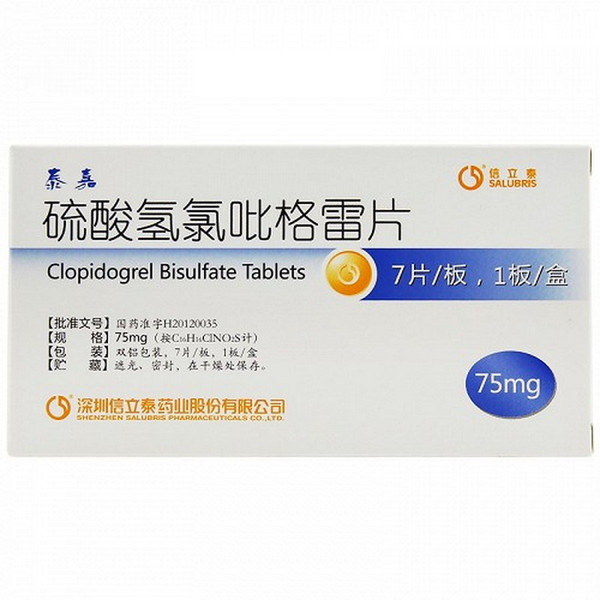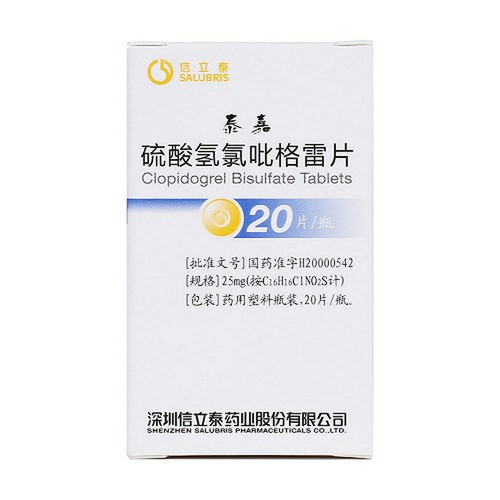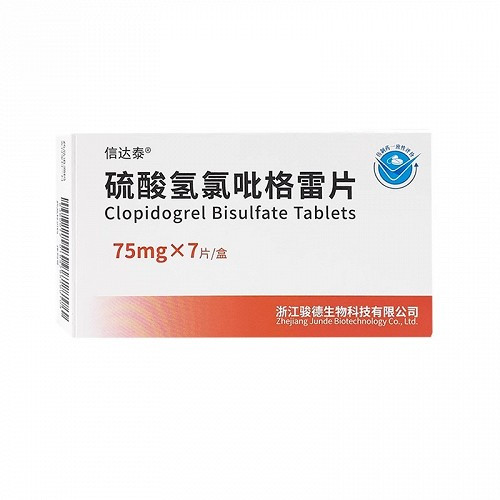Product Overview
[Drug Name]
Generic Name: Clopidogrel Bisulfate Tablets
Trade Name: Taijia Clopidogrel Bisulfate Tablets, 75mg x 7 tablets
[Main Ingredient]
The main ingredient is clopidogrel sulfate.
[Appearance]
This product is a white or off-white, round, film-coated tablet that appears white or off-white after removal of the coating.
[Indications/Main Function]
For the prevention of atherothrombotic events in the following patients: Myocardial infarction (from a few days to less than 35 days), ischemic stroke (from 7 days to less than 6 months), or patients with established peripheral arterial disease. Acute coronary syndrome patients: Non-ST-segment elevation acute coronary syndrome (including unstable angina or non-Q-wave myocardial infarction), including patients with stent implantation after percutaneous coronary intervention, in combination with aspirin. For ST-segment elevation acute coronary syndrome patients, in combination with aspirin, and can be used in conjunction with thrombolytic therapy.
[Specifications]
75mg x 7 tablets (Taijia)
[Dosage and Administration]
Adults and Elderly: The recommended dosage for adults is 75mg orally once daily. However, depending on age, weight, and symptoms, a 50mg orally once daily dosage may be used, with or without food. For Acute Coronary Syndrome Patients: Patients with non-ST-segment elevation acute coronary syndrome (unstable angina or non-Q-wave myocardial infarction) should begin with a single loading dose of clopidogrel 300mg, followed by a continuous dose of 75mg once daily (in combination with aspirin 75mg-325mg/day). Due to the increased risk of bleeding with higher doses of aspirin, the recommended aspirin dose should not exceed 100mg. The optimal duration of treatment has not yet been formally determined. Clinical trial data support a 12-month course of treatment, with maximum efficacy observed after 3 months. ST-segment elevation acute myocardial infarction: Start with a single loading dose of clopidogrel 300 mg, followed by 75 mg once daily, with aspirin, with or without a thrombolytic agent. Do not use a clopidogrel loading dose in patients over 75 years of age. Combination therapy should be started as soon as possible after symptom onset and continued for at least 4 weeks. Studies have not confirmed the benefit of combined clopidogrel and aspirin for more than 4 weeks. Children and Adolescents: There is no experience with this drug in children.
[Adverse Reactions]
Gastrointestinal reactions (e.g., abdominal pain, dyspepsia, constipation, or diarrhea), rash, mucocutaneous bleeding, and rarely, leukopenia and agranulocytosis have been reported.
[Contraindications]
1. Hypersensitivity to the active substance or any of the ingredients of this drug is contraindicated. 2. Severe liver impairment. 3. Active pathological bleeding, such as peptic ulcer or pathological bleeding. 4. Breastfeeding.
[Drug Interactions]
1. Aspirin: This product enhances the inhibitory effect of aspirin on collagen-induced platelet aggregation. No further studies are available regarding the safety of long-term coadministration.
2. Heparin: Studies in healthy volunteers have shown no interaction between this product and heparin. However, caution should be exercised when coadministering these drugs.
3. Nonsteroidal Anti-inflammatory Drugs (NSAIDs): Concomitant use of this product with naproxen in healthy volunteers has been associated with increased gastrointestinal occult blood loss. Therefore, caution should be exercised when coadministering this product with NSAIDs.
4. Warfarin: No safety studies have been conducted regarding coadministration.
[Precautions]
Due to the risk of bleeding and hematologic adverse reactions, a blood count and/or other appropriate tests should be performed promptly if clinical symptoms of bleeding occur during treatment. As with other antiplatelet drugs, clopidogrel should be used with caution in patients at increased risk of bleeding due to trauma, surgery, or other pathological conditions, as well as in patients receiving aspirin, nonsteroidal anti-inflammatory drugs, heparin, platelet glycoprotein Ib/шa (GPIb/шa) antagonists, or thrombolytics. Patients should be closely followed for any signs of bleeding, including occult bleeding, particularly during the initial weeks of treatment and/or after cardiac intervention or surgery. The concomitant use of clopidogrel with warfarin is not recommended due to the potential for exacerbation of bleeding. In patients undergoing elective surgery, if antiplatelet therapy is not necessary, clopidogrel should be discontinued for at least 7 days prior to surgery. Clopidogrel prolongs bleeding time and should be used with caution in patients with bleeding disorders (particularly gastrointestinal and intraocular disorders). Patients should be informed that bleeding may take longer than usual to stop while taking clopidogrel (alone or with aspirin) and should report any unusual bleeding (location and duration) to their physician. Before scheduling any surgery or taking any new medications, patients should inform their doctor that they are taking clopidogrel. Thrombotic thrombocytopenic purpura (TTP) can rarely occur after clopidogrel use, sometimes occurring shortly after initiation. It is characterized by thrombocytopenia, microangiopathic hemolytic anemia, and associated neurological manifestations, renal impairment, or fever. TTP can be life-threatening and requires immediate emergency treatment, such as plasma exchange. Due to a lack of research data, clopidogrel is not recommended for patients with acute ischemic stroke (within 7 days). Experience with clopidogrel in patients with renal impairment is limited; therefore, clopidogrel should be used with caution in these patients. Clopidogrel should be used with caution in patients with moderate liver disease who may have a bleeding tendency, given limited experience with its use. Patients with the rare hereditary conditions galactose intolerance, Lapp lactase deficiency, or glucose-galactose malabsorption should not use this drug. Clopidogrel has not been associated with any effects on driving or operating machinery.
[Use in Elderly Patients]
No dosage adjustment is required for elderly patients.
[Overdose]
Overdose with clopidogrel may cause prolonged bleeding and bleeding complications. If bleeding is observed, appropriate treatment should be initiated. There is no known antidote for the pharmacological activity of clopidogrel. If rapid correction of prolonged bleeding is necessary, platelet transfusions can reverse the effects of clopidogrel.
[Pharmacology and Toxicology]
Pharmacodynamic Properties: Clopidogrel is a platelet aggregation inhibitor that selectively inhibits the binding of adenosine diphosphate (ADP) to its platelet receptor and the subsequent ADP-mediated activation of the glycoprotein glycoprotein glycoprotein (Gp) complex (Gp2b/Gp2a), thereby inhibiting platelet aggregation. Clopidogrel requires biotransformation to inhibit platelet aggregation. Clopidogrel also blocks platelet aggregation induced by other agonists through ADP release. Clopidogrel's effects on platelet ADP receptors are irreversible, affecting the lifespan of platelets exposed to clopidogrel. The rate of recovery of normal platelet function is consistent with platelet turnover. Repeated oral administration of 75 mg of clopidogrel once daily significantly inhibits ADP-induced platelet aggregation starting on the first day. The inhibitory effect gradually increases, reaching steady-state within 3-7 days. At steady-state, the average inhibition level for 75 mg of clopidogrel daily is 40%-60%. Platelet aggregation and bleeding time generally return to baseline within 5 days after discontinuation of treatment. Toxicology Studies: In preclinical studies in rats and baboons, the most common reaction was hepatic changes. These hepatic changes were attributed to drug effects on hepatic metabolizing enzymes at doses 25 times the human exposure achieved with a 75 mg/day dose of clopidogrel. Clopidogrel has no effect on hepatic metabolizing enzymes at therapeutic doses in humans. Very high doses of clopidogrel in rats and baboons have been associated with gastric tolerability (gastritis, gastric ulcers, and/or vomiting). No evidence of carcinogenicity was found in mice and rats at doses up to 77 mg/kg daily for 78 weeks and in rats for 104 weeks. This dose resulted in plasma concentrations 25 times greater than the recommended human dose (75 mg/day). Clopidogrel was non-genotoxic in a series of in vivo and in vitro studies. Clopidogrel had no effect on fertility in female and male rats and was non-teratogenic in rats or rabbits. Clopidogrel administration to lactating rats slightly delayed pup development. Pharmacokinetic studies have demonstrated that clopidogrel and/or its metabolites are excreted in breast milk. Therefore, a direct or indirect effect of clopidogrel cannot be excluded.








